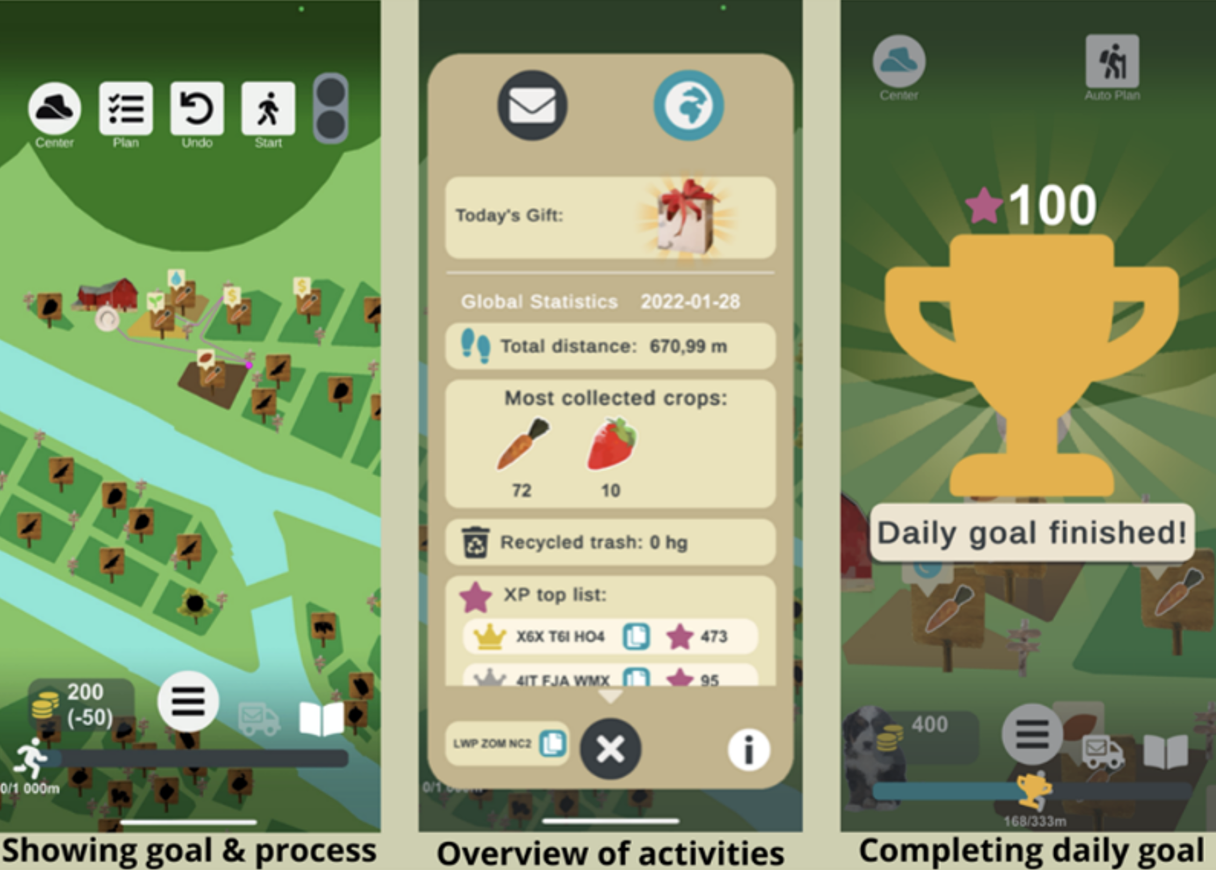Clinicaltrial.gov Identifier: NCT05641662
BACKGROUND AND PURPOSE
In general, everybody is recommended to be physically active for at least 150 minutes a week to improve health. Physical activity helps us to participate in daily life activities, stay independent for a longer time and have a good quality of life. A lack of physical activity and a high sedentary time (‘sitting time’) are also associated with an increased risk of diabetes, cardiovascular disease, and mortality. The number of individuals suffering from one or multiple chronic illnesses (e.g., heart disease, stroke, diabetes, chronic lung disease) is increasing worldwide. Especially, many elderly persons with a chronic illness are physically inactive and find it challenging to leave home to participate in physical activity programs, due to symptoms, lack of easily accessible facilities or fear for being exposed to infection.
Developing physical activity interventions that are tailored to the needs and preferences of persons with a chronic illness is challenging, because it needs an interdisciplinary approach and active collaboration with end users. With the results of previous work, we designed, with persons with a chronic illness, a mobile exergame (game that requires physical activity in order to play), called Heart Farming, that is tailored to their specific needs and preferences.

The overall purpose of this study is to evaluate the effect of a tailored mobile exergame at home (indoor and outdoor) for inactive persons with a chronic illness to reduce their sedentary time, increase their daily physical activity, submaximal exercise capacity, decrease physical frailty and improve health-related quality of life.
RESEARCH QUESTIONS:
- How can an exergame (Heart Farming, see figure) be used by persons with chronic illnesses? (Work package 1)
- How effective is the Heart Farming exergame to reduce sedentary time, increase daily physical activity, increase submaximal exercise, decrease physical frailty and improve health related quality of life in inactive persons with chronic heart failure compared to a control group receiving activity advice only? (Work package 2)
- What is needed to introduce tailored exergaming structurally into daily life and society, addressing motives, barriers, and cost aspects? (Work package 3)
WORKPACKAGE 1
Research question 1: How can an exergame (Heart Farming) be used by persons with chronic illnesses?
Design and method:
Design: A descriptive study
To determine the usability of tailored mobile exergaming for persons with a chronic condition (acceptability, the demand, the implementation, practicality, adaption, expansion, and perform limited-efficacy testing) (28) we will include 300 adult persons with a chronic condition (stroke, diabetes, Parkinson’s Disease, COPD, long-term psychosis and/or rheumatic disease). Participants will receive installation and instruction for the mobile exergame. The exergame will be tailored to their exercise capacity. They will also be able to play with a person in their own network.
Data collection:
In total 300 persons with chronic illnesses will be recruited from the volunteer patient organisations. All persons will have access to the mobile exergame for 3 months. The persons will be advised to walk 10 minutes more every day with help of the exergame. Data will be collected on baseline and after three months to assess acceptability, the demand, the implementation, practicality, adaption, expansion, and perform limited-efficacy testing.
WORK PACKAGE 2
Research question: How effective is the Heart Farming exergame to reduce sedentary time, increase daily physical activity, increase submaximal exercise, decrease physical frailty and improve health related quality of life in inactive persons with chronic heart failure compared to a control group receiving activity advice only?
After development od an mobile exergame, we performed several feasibility studies with persons with a chronic illness from a patient organisation and with other volunteers. We found that participants were eager to learn about the game and their satisfaction was mostly related to the extra physical activity they got from the game. To test the RCT trial design we performed a pilot test. We collected as in the RCT at baseline and 3 months with physical tests, activity monitors, questionnaires, interviews, as planned in the RCT.
Randomized controlled trial: We have now included 30 persons in a randomized controlled trial (RCT) to test the effectiveness of the Heart-Exergame intervention. The study is a single-blind parallel two-arm randomized multicentre controlled study with 1:1 allocation to intervention and control group. In total 600 inactive persons with heart failure will be recruited from ten hospitals and randomized to an intervention of exergaming at home for 12 weeks or a control group receiving individual physical activity advice.
Participants will be included from 3 hospitals in Sweden: Region Östergötland, Kalmar, Region Jönköping, from 3 hospitals in Spain, and 3 in the Netherlands.

Control: Participants will receive usual treatment and information about daily activity. Based on their current activity level and preferences, persons will receive a protocol-based activity advice from a health care provider that corresponds to the intervention group in terms of time and effort.
Intervention group (Exergame): The newly developed game ‘Heart Farming’ is an exergame that uses so called mobile Augmented Reality (AR) motion. The game can be played both indoors and outdoors and stimulates players to be physically active, either by walking or sit-to-stand movements tracked by AR mobile technology. The game is built around the theme ‘farming’ that gives the players a simulated experience of managing a farm and have some fun at the same time. Farm games are popular, since they are visual and players can grow new crop, they can be goal-oriented, and players can set individual goals without feeling any pressure. In the Heart Farming exergame, players are motivated to collect daily products by being active in the real life. (See introduction section)
WORK PACKAGE 3:
Research question 3: What is needed to introduce tailored exergaming structurally into daily life and society, addressing motives, barriers, and cost aspects?
Design: Convergent mixed methods will be used to interpret the data by converging both quantitative and qualitative data.
Data collection :
- What are experiences using tailored exergaming, what are motives for exergaming and what are barriers to implementing exergaming structurally in persons daily practice?
Data collection: Data on motivation to be physically active, focussing on importance of tailoring factors like playing with physical friends, virtual friends, direct feedback will be collected by a questionnaire (Situational Motivation Index and the enjoyment scale). Furthermore qualitative data on experiences and motive of persons from the workpackage 1 and 2 will be collected by interviews.
- What are the perspectives of policy makers (politicians and heads of departments), representatives from patients’ organisations, game designers and health care professionals regarding the implementation of exergaming in routine service delivery as part of the Nära Vård reform.
Data collection: Data from policymakers (n=5-10), representatives from patients’ organizations (n=10), game designers (n=5-10) and health care professionals (n=10) will be collected with semi structured interviews.
- Health economical aspects In the RCT in workpackage , data will be collected by chart review, registration of costs during the study and a willingness to pay questionnaire.(39) We will collect data on Quality-adjusted life years (QALYs) based on EQ-5D-5L in workpackage 1 and 2. We also collect the cost of development and maintenance of the exergame.

